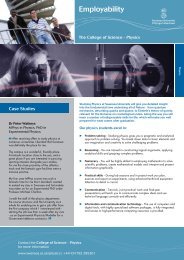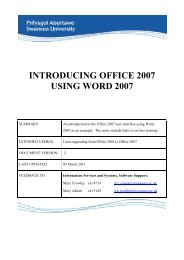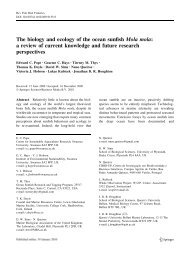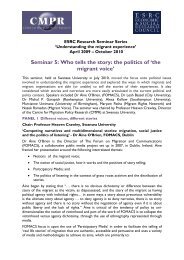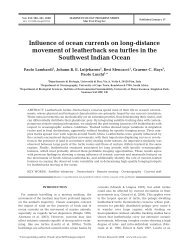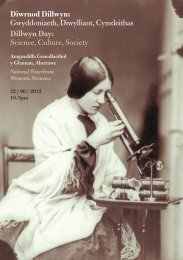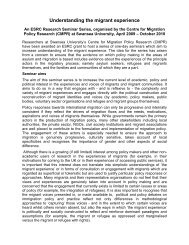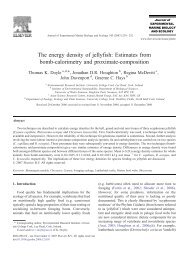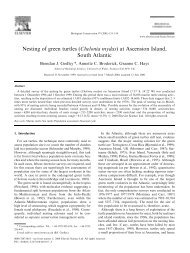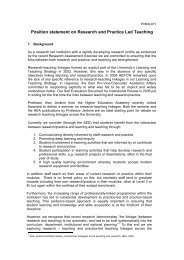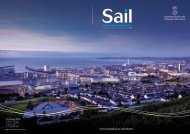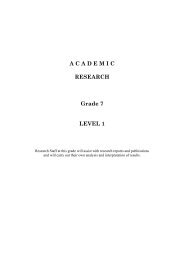Postgraduate Prospectus 2013 - Swansea University
Postgraduate Prospectus 2013 - Swansea University
Postgraduate Prospectus 2013 - Swansea University
You also want an ePaper? Increase the reach of your titles
YUMPU automatically turns print PDFs into web optimized ePapers that Google loves.
Media Studies<br />
Research opportunities<br />
MA by Research/MPhil/PhD<br />
RAE2008 35% of research<br />
rated world-leading (4*) or internationally<br />
excellent (3*)<br />
Professors<br />
K Williams<br />
Academic and research staff 7<br />
<strong>Postgraduate</strong>s 25<br />
From traditional print and broadcast<br />
media to film and television, digital<br />
publishing, social networking, and public<br />
relations, the media increasingly defines<br />
the way we interact with our society. It<br />
shapes the way we see ourselves and<br />
others, and can be a powerful tool for<br />
social change, good or bad.<br />
Media Studies at <strong>Swansea</strong> has a<br />
broad vocational and international<br />
outlook that reflects the challenges of<br />
our media-rich world.<br />
Research degrees in Media Studies will:<br />
• provide you with new and specialised<br />
research skills<br />
• prepare you for a career in academic<br />
research and teaching<br />
• equip you with skills relevant for a<br />
rewarding career in a range of<br />
media-related industries<br />
Research Strengths<br />
MA by Research, MPhil and PhD<br />
supervision is available across a wide<br />
range of research topics in media studies,<br />
organised into two research groupings:<br />
Media Studies research students are<br />
located in numerous constituent<br />
Departments in the College of Arts and<br />
Humanities. Collaboration with Politics<br />
and Modern Languages is particularly<br />
strong. For details please see: www.<br />
swansea.ac.uk/artsandhumanities<br />
Entry requirements:<br />
For PhD: normally a good Honours degree<br />
(first-class or 2:1) and an MA in a relevant<br />
field. For MRes or MPhil: a good Honours<br />
degree.<br />
World Cinema<br />
This group brings together substantial<br />
expertise in the history, theory and<br />
reception of World Cinema and is<br />
engaged in a variety of provocative<br />
analyses of films, filmmakers, movements<br />
and film-watching communities and nations<br />
in relation to history, literature, philosophy,<br />
new media and politics.<br />
Key themes include:<br />
• European cinema history, theory and<br />
criticism<br />
• Eastern European Cinema<br />
• Film Theory and Aesthetics<br />
• German and Eastern European cinema<br />
• French cinema, particularly the<br />
French New Wave<br />
• Documentary<br />
• Media, nation and identity<br />
• Independent American cinema<br />
• Hollywood<br />
• Transnational cinema<br />
• New Screen Technologies<br />
• The media in Wales<br />
• Welsh, Celtic and British cinema<br />
• Welsh-language film, radio, television<br />
and new media<br />
English Language requirement:<br />
IELTS 6.5 (with a minimum of 5.5<br />
in each component) or <strong>Swansea</strong> <strong>University</strong><br />
recognised equivalent.<br />
Scholarships and Bursaries<br />
A range of postgraduate scholarships<br />
and bursaries is available.<br />
For details, please visit: www.swansea.<br />
ac.uk/scholarships/<strong>Postgraduate</strong><br />
Media History, Theory and Technology<br />
This group combines research at the nexus<br />
between media history, theory and<br />
technological change, addressing key<br />
issues in the emerging global digital<br />
world. The group seeks to develop a<br />
critical understanding of networked digital<br />
media and online social practices and<br />
their social, economic and political<br />
dynamics in order to inform academic<br />
research, wider policy issues and public<br />
debates. The relationships between media<br />
technology, cultural form and the shift from<br />
‘atoms to bits’ are addressed through a<br />
range of innovative methodological<br />
approaches together with a focus on<br />
placing these developments within a<br />
historical and social context.<br />
How can I find out more?<br />
Visit our website:<br />
www.swansea.ac.uk/mediastudies<br />
Contact the Admissions Tutor:<br />
Email:<br />
COAHGradCentrePGRAdmissions@<br />
swansea.ac.uk<br />
Tel: +44 (0)1792 295926<br />
Visit the <strong>University</strong>:<br />
see page 174 for details<br />
Key themes include:<br />
• Visual media and visual culture<br />
• Print and broadcast media<br />
• Science fiction and technology<br />
• Music and popular culture<br />
• Journalism<br />
• The deep history of media<br />
• Media archaeology<br />
• Postmodern theory<br />
• Theories of the information society<br />
• Network society<br />
• Post-Fordism<br />
• Global communication<br />
• Media and the public sphere<br />
• Political theory and the media<br />
• Jean Baudrillard<br />
• Moral panics and the media<br />
• Social and political aspects of media<br />
• Methodologies for researching media<br />
• New media<br />
• Philosophy of technology<br />
• Intellectual property rights<br />
• Theories and history of technology<br />
• Software studies<br />
• Auditory technology and sound<br />
• Digital democracy<br />
• Social networking<br />
• Computer code<br />
• Remediation<br />
Applications can be made online<br />
at: www.swansea.ac.uk/applyonline<br />
– see pages 176 – 177 for further<br />
information<br />
For details of the Master’s courses<br />
available in Media and Communication<br />
Studies, please see page 74.<br />
Media Studies also benefits from research<br />
groups exploring gender, technology,<br />
war, and global journalism, and<br />
incorporates work on moral panics and<br />
media and identity in small nations, with<br />
particular reference to Wales.<br />
All research students in Media Studies<br />
belong to the Graduate Centre in the<br />
College of Arts and Humanities. The<br />
Centre provides pastoral as well as<br />
administrative support and is also<br />
responsible for research skills training<br />
and support, and facilitating a lively<br />
intellectual environment for the College’s<br />
postgraduate research community<br />
of 200 students.<br />
Research Degrees – Media Studies<br />
126<br />
127



